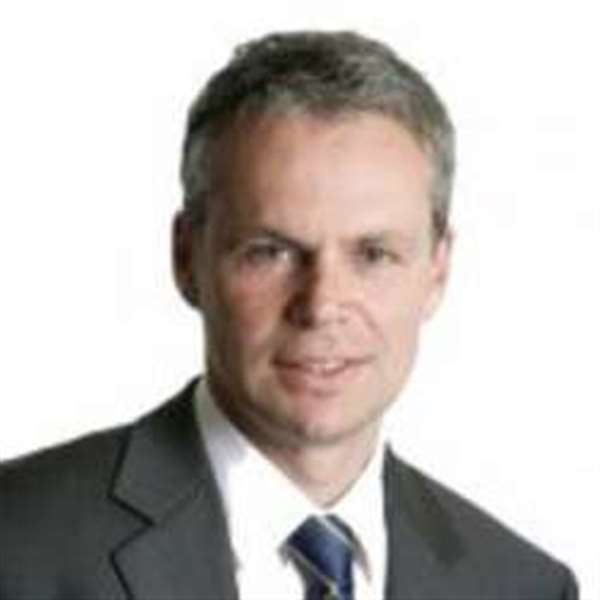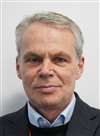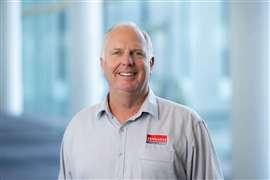Read this article in French German Italian Portuguese Spanish
Meet Stuart Dean, the next CEO of Kennards Hire
23 January 2025
Speaking to International Rental News (IRN) at the Bauma China show in Shanghai, Stuart Dean pays tribute to outgoing CEO Bill Whitehouse and explains the priorities for the Kennards Hire business.
There are changes afoot at Kennards Hire in Australia, where CEO Bill Whitehouse – the 35-year veteran of the business – stands down in April, to be replaced by current COO, Stuart Dean. Whitehouse will take a break and then return to the board in August as non-executive director.
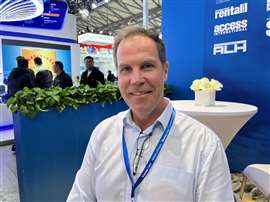 Stuart Dean, Kennards Hire COO, pictured at the 2024 Bauma China exhibition. (Photo: IRN)
Stuart Dean, Kennards Hire COO, pictured at the 2024 Bauma China exhibition. (Photo: IRN)
Dean joined Kennards as group IT program manager in 2009 and in 2016 was promoted to general manager of IT. In 2017 he became general manager for Queensland and in 2019 was appointed COO, based at Kennards’ head office in Sydney.
The incoming CEO will be taking on a different, larger Kennards Hire. Over the past five years, it has targeted business with major contractors, widening its customer base beyond the homeowners and local contractors that has been its traditional focus.
IRN: Let’s address the leadership changes at Kennards. It’s a natural process as experienced people reach their retirement, but also presents opportunities?
Stuart Dean: I think it’s a really exciting period in our business and what you said is 100% true. There’s real nostalgia associated with it and pride in the legacy that a lot of these guys who are moving into the next phase of their life are going to leave behind.
And for those of us who have the mantle to take forward, there’s a lot of things that are coming together at the right time to support the next phase of growth for Kennards. And that’s tremendously exciting at the same time. So, I think the most important thing that I take responsibility for and treat with delicate hands, is that we don’t change who we are.
The history of Kennards Hire over 75 years, the DNA of who we are, is built into our culture and comes from the Kennard family through the board, through the leadership team. [Being family owned] is part of the competitive advantage that we have.
IRN: How do you assess Bill Whitehouse’s contribution to the business?
Stuart Dean: Nothing short of remarkable. He’s been my boss for the past eight years and he has been a real legend of the rental industry in Australia and New Zealand and internationally, with connections all over the globe.
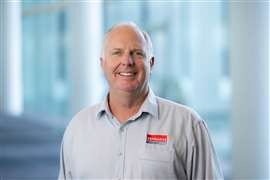 Current CEO Bill Whitehouse steps down as CEO in April, but will be a non executive director from August this year. (Photo: Kennards Hire)
Current CEO Bill Whitehouse steps down as CEO in April, but will be a non executive director from August this year. (Photo: Kennards Hire)
He has stewarded our business through some of the most challenging times, particularly through Covid. We’ve seen growth under his tenure as CEO of around 60% to 70% on revenue, over the last five years.
And I think his superpower is that he builds teams and gets the best from those people because he’s at the heart of it. He’s a quality bloke and so he will be missed.
I’m so glad he’s going to come onto the board. But not only that, he’s a good mate of mine as well. So I hope he has a fantastic retirement, when it comes.
IRN: Your own background is firmly in Australia’s equipment rental industry?
Stuart Dean: I’ve had 15 years with Kennards, actually this month [November 2024]. I was with Coates for two years during the merger of Coates Hire and National Hire [in 2007]. And I was with National Hire prior to that. So, five years with National Hire, two with Coates, and 15 with Kennards.
IRN: You talk about the identity and the culture of Kennards not changing, but at the same time, there are opportunities to further develop the business. What is the plan?
Stuart Dean: So, the changes are not in strategic direction; that’s a strategy that is rock solid and has been worked on and refined over the last three years. We set a three-year plan, and we set our annual plans in behind that.
I think the excitement comes from executing on those plans. Our history has always been in trade and DIY, and we take great pride in that business we have in Australia, although half our business now comes from the commercial market, half of it. And that really has only happened in the last five years.
IRN: Five years ago it would be have been 10, 20%? It’s an enormous shift.
Stuart Dean: And a deliberate shift. That’s where the growth opportunity for us is. We understand the volume that market can generate and the potential.
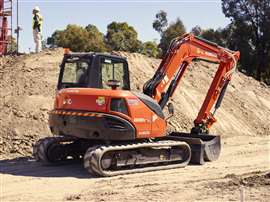 An 8 tonne Kubota KX080-3 excabator in the Kennards Hire fleet. (Photo: Kennards Hire)
An 8 tonne Kubota KX080-3 excabator in the Kennards Hire fleet. (Photo: Kennards Hire)
Prior to the expansion it would’ve been about 30% DIY, 50-60% small trade contractors, man-in-the-van type customer. So 10% to 20% on the larger construction type segment. It’s not that we’ve lost market share in the other two - that’s really continued to grow year-on-year at a consistent rate - the real uplift has been in commercial.
IRN: How have you done it?
Stuart Dean: It’s been a multi-pronged approach. We articulated the vision early on, we set the strategy in place behind it, and then we set about it really from a customer engagement point of view. So, building deep meaningful relationships, first and foremost, understanding what their needs were, and then building the capability and the capacity behind it. I guess in the last five years, we’ve expanded our sales teams.
And operationally, we’ve invested significantly. We now have five distribution centers across Australia. Those five centers are doing circa A$100 million in revenue, to give you a number. They are really aligned to that market, so giving the capability and depth of product we didn’t have before.
IRN: You’re moving up in size with excavators and things like that?
Stuart Dean: Yes, we have in some categories. Particularly in power generation, pumps and fluid management, we’re carrying some significant bits of kit, and likewise in aerial work platforms. So, we are not averse to that space, perhaps like we were in the past.
But there is still room for us to expand and understand and grow into those markets. So things like earthmoving, we really at the moment carrying up to 8 tonnes. We’ve got some 14 tonne rollers, 14 tonne excavators, but only in certain parts of the business. So how that expands over the future will be interesting.
IRN: I suppose it’s important to reassure your traditional customers?
Stuart Dean: Without doubt. The overriding sentiment and the strategic plan for the organization is that that’s our core customer. We treasure them, we value everything that they bring to our business, and we won’t lose that as we go forward.
IRN: Coates has always been a competitor to some degree, but with the push into commercial you will be going more squarely head-to-head with them.
Stuart Dean: They’re a formidable competitor and I’ve got great respect for the Coates organization. They do some things that we don’t do and there are other things that we’ve got certain strengths in as well.
I think there’s that respect and healthy competition and that is a really important thing. It keeps us grounded and focused, and it’s not just Coates. There’s a lot of change in the Australian market, and that competitive landscape is only going to become more competitive.
IRN: Kennards is famous for the number of specialist divisions it has - you’re an early adopter of that strategy. How important is that? Is it continuing to grow, is it important to the commercial segment, and are there opportunities for new divisions?
Stuart Dean: Yes, all of the above. It’s a very nice part of the business because of the ability to segregate yourself from the competition and really find a niche market that’s going to work, but also complements everything else we’re doing. And particularly in relation to the commercial market sector.
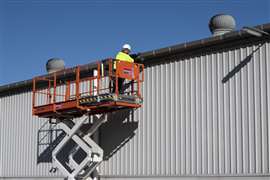 A Snorkel S2755RT scissor in the Kennards Hire access fleet. (Photo: Kennards Hire)
A Snorkel S2755RT scissor in the Kennards Hire access fleet. (Photo: Kennards Hire)
So the answer is yes, they are continuing to grow and we are continuing to invest in this space strategically. We look at that as a core pillar of growth for us, in the short, medium and long time.
IRN: Any particular products that you see an opportunity for coming up?
Stuart Dean: We’re well entrenched in water management, power generation, traffic, site services. Portable buildings has been a really big investment for us over the last two to three years, particularly. We’ve gone from almost having none in our fleet to having over 1500 in that two-year period. And we’re looking at strategic opportunities as they occur, and from an acquisition point of view or a further investment.
And then we’re looking at adjacents. We carry a vast range of industrial vehicles and we’ve got opportunity in that space, and ground support systems, things like shoring. We’ve started that investment in a small way, and we’ll look at how that unfolds over the near horizon.
And its quality above quantity - ensuring that we don’t over-promise and under-deliver.
IRN: How is the Australian market just now? Reasonable?
Stuart Dean: Yes, I think that’s an apt word for it. I see a much more nuanced market than it was during Covid when everything was up all at the same time and we had a great run. We are now probably back to a little bit more how it was pre-Covid, where certain States and jurisdictions are, from an economic point of view, struggling or stable and others are performing really well.
I think when you look across the markets that we serve starting in the east with New Zealand, it’s been tough there for a number of years and that’s not news to anyone. I think that’s still got a little way to run. I feel like we’re at the bottom of that cycle in New Zealand, but it’s going to take time.
We now have over 30 locations in New Zealand. And that business continues to grow even in a struggling economy. So that’s a core part of our business.
IRN: And Australia itself, there’s always this division between infrastructure and mining, oil and gas. Have you got a big exposure to the oil and gas and mining sector?
Stuart Dean: That’s been part of the commercial expansion. We made an acquisition in Western Australia and another one in Northern Territory over the last 10 years. They continue to be very good for us. We’ve got great leadership in that space, and really strong prosperous businesses. Slightly different perhaps to what Coates are doing up in that part of the world, but I think we are doing our thing really well.
IRN: Different In what way?
Stuart Dean: You know, Coates are probably more on onsite, more entwined in direct distribution to the mines. OnSite Rental Group [bought by Malaysia’s Sime Group in 2023] are the other ones who have a good network footprint in that part of the world.
It’s not that we don’t have exposure in those places - I think we’re more than holding our own competitively and doing an incredibly sound job. And that’s exciting for us - there’s nothing but opportunity in that space.
IRN: In Europe you see all the rental companies wrestling with the energy transition. It depends on so many things, the regulations behind it, the customers. What’s the situation in Australia and what’s Kennards’ approach to investment in that kind of equipment?
Stuart Dean: It’s coming from a number of perspectives. It’s not as regulated as in Europe - not yet - but we know it’s coming. So, we have that to contend with and understand the timing around what is a real need and a drive from our customer base.
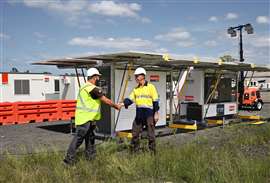 Kennards Hire’s fleet includes this Makinex hybrid power system, the HPS45, with a 45kVA genet, 60kWh battery, and 8kWp solar panels. (Photo: Kennards Hire)
Kennards Hire’s fleet includes this Makinex hybrid power system, the HPS45, with a 45kVA genet, 60kWh battery, and 8kWp solar panels. (Photo: Kennards Hire)
That’s something we embrace wholeheartedly. We’ve embarked on a thorough ESG strategy in terms of us as an organisation, but also in terms of products and what we’re willing to engage in, either trial or test or put into the core fleet and really maximize the value of the return from that investment.
IRN: Are you seeing a real demand from customers yet?
Stuart Dean: I think if they had the choice and all things given parity, they would take the green option every day of the week. So it’s just about understanding the value and it’s a shift in mentality for both us and the customer. But we’re making great progress - we don’t want to be bleeding at the front of it, but we certainly want to be leading that change and that transition.
IRN: Which product categories are you being most progressive with that. Is it power and aerial platforms and lighting towers?
Stuart Dean: It’s right across the range. The investment is going into power generation - that’s where we’re really putting a lot of time and focus. But that’s not to say we’re not looking at right across the range of what we carry.
IRN: So, battery energy storage systems (BESS) to augment the diesel power fleet?
Stuart Dean: Modularised solar or wind power to recharge those battery energy storage systems, and how that then links onto, say, portable buildings. All of that we’re doing in a meaningful way and we have all that product on hire right now.
IRN: And you are looking at product this week at Bauma China...
Stuart Dean: We certainly see the rise of the industrial might of China, but what we’re seeing here is on a scale, at a level that we probably weren’t quite prepared for. It’s opened our eyes just to what’s coming. For us, being aware of it, understanding the level that it’s at and being proactive in terms of what that means is really important. That’s why we’re here.
It’s a tidal wave that no one’s stopping. Obviously, the back-up and the support for us in Australia, that’s a different ball game and is equally important. I think there’s a little bit of work for the Chinese OEMs to do in that space, but certainly they’ve made some serious headway, particularly in certain categories.
They’re leading in access into the Australian market. We’re starting now to see the earthmoving and the other categories come in behind it.
It’s early days for us. We bought an access business in Darwin and they were carrying the LGMG product. So, we’ve got a product that’s five or six years of age. And we’ve just put some Sinoboom into the fleet as well. As I said, it’s very early days, and everything’s great when it’s new, as the saying goes.
IRN: What is your approach to digitalization and investment in technology? What are your priorities?
Stuart Dean: Technology is a core enabler of any business today. And for me, it always comes back to how does it add value to the customer? And there’s a part of technology, which is the [basic] part that enables you to do business - and you need those things to be well and truly done. But what’s going to separate us from our competition? And that’s where our focus is at and that’s what we’re investing a lot of time in building capability
So that’s about obviously product innovation [in the fleet] for sure. It’s transparency of product with IoT and then continue to develop and evolve our Easytrak platform. It’s about becoming more efficient and increasing productivity internally so that we can provide a better service to our customers.
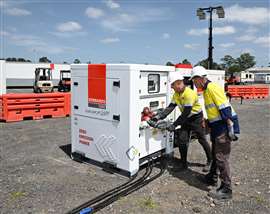 A Kennards Hire battery energy storage unit on site. (Photo: Kennards Hire)
A Kennards Hire battery energy storage unit on site. (Photo: Kennards Hire)
And then I think we will see our customers embrace technology more and more from an ease of doing business perspective. And that’s a real driver that we get from our customers: if you make it easy for us and you can really add value.
IRN: Any key projects or investments you’re making at the moment?
Stuart Dean: There always is. About six years ago we wrote our first mobility platform, software application, to integrate our ERP effectively. So, we can enable transactions, our locations and also our customer sites. That’s going through a significant rewrite and modernisation right now.
We’re looking at the next stage of data insights and data intelligence. The reporting platforms that we use are I believe in fantastic shape. The next step in that is exciting for us. So that does receive an enormous amount of investment and resource contribution. And then there is the whole digital journey for our customers - the next evolution of our website, the end-to-end customer journey and how we make that seamless.
IRN: What will “the next step” in data allow you to do?
Stuart Dean: I think it will make far more intelligent decisions based on what we’re seeing. I think AI is certainly coming in a big way, but again, it’s about being pragmatic, really bringing it back to what’s going to add value and what’s real.
I think we’ve got things that we’re trialing now in terms of our knowledge base and all of the intellect that the organisation has and how we just enable that in a much smarter fashion.
IRN: Any examples?
Stuart Dean: Take what’s happening in power generation. A traditional generator paired with a battery system, with a solar array, on a smart enabled site compound which has been mobilised through technology that’s being used to plan and design the layout and which has been worked on in partnership with our customer.
It meets their requirements from a regulatory point of view, from a sustainability perspective and then integrates back into our data intelligence. Not only from our people’s point of view who are looking at that, but from what an AI perspective, that’s saying, have you seen this?, a trend in the data that might provide some insight which then leads to a different service offering.
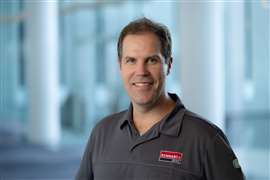 Stuart Dean joined Kennards Hire in 2009 after five years with National Hire and two with Coates. (Photo: Kennards Hire)
Stuart Dean joined Kennards Hire in 2009 after five years with National Hire and two with Coates. (Photo: Kennards Hire)
How does the industry evolves in this connected space, right? And it’s not one thing, it’s all of those things that are going to come together to provide the synergies and the customer experience in the future.
IRN: So there’s a lot happening. How ambitious is Kennards in terms of market share or just absolute growth?
Stuart Dean: We’ve never been in growth for growth’s sake - that’s not who we are. For us, growth is important to any organisation because it provides opportunity for people, ensures there’s a health to the company ongoing. But that growth for us is all about quality growth in meeting the needs of our customers. And that will play true over the next five years as it has over the past seventy-five.
And therefore, it’s not about setting this aspiration that we’re going to at all costs. It’s about setting a robust, strongly held vision that’s supported by all of the stakeholders of the organisation and then putting in the fundamentals of a really sound execution on that strategy.
So, I don’t know where we’ll be in five years, to give you the answer. I know that we have incredible people, that we have a healthy appetite, if that answers your question to a degree.
Because we want to see that for the health, not only for our shareholders and stakeholders, but for the people who work in the business. And that’s a profound responsibility that I have going forward.
STAY CONNECTED



Receive the information you need when you need it through our world-leading magazines, newsletters and daily briefings.
CONNECT WITH THE TEAM
